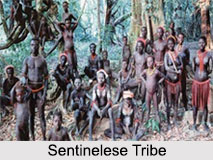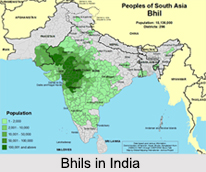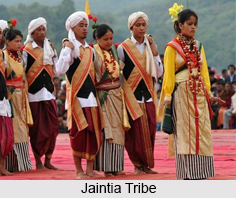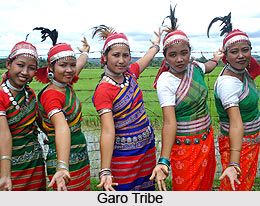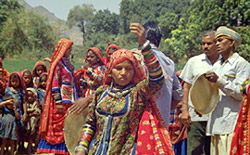Introduction
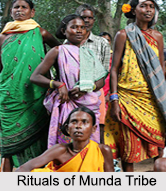 Rituals of Munda Tribe reflect the age old tradition and culture of the Mundas that have been passed down through generations. From the birth to death, the life of a Munda Tribe is closely associated with different kinds of religious activities and sacred performances. The Munda Tribes are the residents of West Bengal and are also found in Jharkhand, Odisha and Assam.
Rituals of Munda Tribe reflect the age old tradition and culture of the Mundas that have been passed down through generations. From the birth to death, the life of a Munda Tribe is closely associated with different kinds of religious activities and sacred performances. The Munda Tribes are the residents of West Bengal and are also found in Jharkhand, Odisha and Assam.
Birth Rituals of Munda Tribe
When a pregnancy is discovered the Mundas engage in making preparations to offer sacrifices to their deity Garasibonga, believed to take care of the pregnant woman. The expecting woman`s father or brother are informed and are welcomed to her house. A date is fixed on which a fowl is sacrificed in the name of Garasibonga and offerings are made to him. The woman after the ritual is regarded as ceremoniously polluted and is forbidden from touching anyone or any objects. Members of the tribe are restricted form entering into the confinement room or to accept food room her. The state of ceremonial pollution is observed for nine days after which the umbilical cord is secretly placed in a ditch outside the house. In certain cases it is also placed inside the courtyard to prevent anybody from casting magic on it.
After a period of nine days the mother and her child is taken to a nearby pond where they are bathed upon which they are believed to be pure to prepare food and to be touched by anybody.
Chhathi in Munda Tribe
Chhathi is a purification ritual celebrated to sanitize from social uncleanness caused by the birth of a child. The ritual is celebrated after 3, 6, or 9 days after the birth of the child. In the morning the family members and the invitees get their hair shaved and later anointed with oil. The hair of the new born baby is also shaved and stored in a leaf cup. The mother accompanied by a woman arrives to a nearby pond or stream carrying with her the clothes worn by her at the time of birth as well as the baby`s hair that is later thrown into the water. After the application of turmeric and oil kept in three different leaf cups, the mother, her baby and the other woman who assisted during the delivery period take bath. After bathing the mother-in-law of the child`s mother offer water to the later by means of her joined palms. The mother then throws the water towards her back thrice from her left hand side and thrice from right hand side. They then wash their faces and return home. The mat used by the mother before Chhathi is taken to the village pond and burnt there.
The house is smeared with cow dung, lined in various patterns with dough of rice flour and then with vermillion. A low sitting stool is placed in the middle under which paddy grains are kept. The father along with the child in his lap occupies the stool surrounded by guests and the family members who shower blessings on the baby.
Naming in Munda Tribe
The day following the Chhathi is celebrated as the naming day of the child. The bhayads of the child`s father are invited for the ritual. The mother sits with the child in her lap. A big brass or bronze and in some cases leaf cups filled with water are placed before the child. A grain of pearl rice is dropped in the water of the plate to keep it floating on the surface level. Another grain of rice is dropped into the water by pronouncing a name of one of the child`s ancestors or relatives. It is closely seen whether the second grain coincides with the first. If the second grain sinks to the bottom, another name is pronounced and a rice grain dropped in the water. The process continues until the second rice grain coincides with the first one. Then the name uttered is kept as the name of the child. At times a temporary name is given to the child according to the day on which he was born. Later the procedure for keeping a permanent name is adopted.
Sutam Tol in Munda Tribe
On the naming day or on the following day, a black thread is tied round the waist of the child to protect him from evil eye and to safeguard him from life dangers or other hurdles. This ceremony has been termed as Sutam Tol.
Ear Boring in Munda Tribe
Ear boring ceremony of the child, also known as Lutur Tukui, is celebrated during any of the winter months of the first three years of the birth of the child. The person after whom the child has been named presents the child with rice, pulse, oil, beer, goat and a piece of new cloth. On the ear boring day the courtyard of the house is thoroughly cleaned and plastered. A figure of parallelogram with all its diagonals is drawn with rice flour paste. Few paddy grains are spread over the diagram and a small tool is placed on it for the child to sit on it. The father of the child first massages his head with oil and then follows the same procedure on the child. Then two appointed people, usually barbers, invited for the ceremony besmear the labule of the ear of the child with vermillion with the aid of a silver or copper ear borer. The borer is then kept twisted in the form of a ring in his ears.
At the end of the ceremony a fowl or a goat is sacrificed and blood is sprinkled on the figure drawn. Later feasting and drinking ensures followed by the guests showering their blessings on the child.
Death Rituals of Munda Tribe
Death rituals of Munda Tribe are mostly related to observance and adherence of specific rites and customs to nullify the pollution of death. The Munda believe in rebirth and it is thought that he was earlier a Munda and would always remain so. It is also deemed by them that after the death the spirit of the deceased moves about the remains of the body and continues to loiter about aimlessly in the surroundings of the house until proper rites are performed. Hence it must be appeased by performance of different rites and rituals until it finds its permanent shelter. It is thought that as the members of a family live together in a common house, the members of the family of the spirits also reside in a common house.
After the death on the third or fifth day the bhayads i.e. the relatives of the dead man shaving their hair and bathe to purify themselves. Next they fetch four saplings of tiril tree. Two of them are planted crosswise on the spot where the cot that carried the corpse was placed during their way to the burial ground. The third sapling is fixed at the junction of the two that makes it appear like a star.
An earthen vessel is next placed on it and the complete structure is covered with straw that depicts a miniature hut facing north direction. The hut is supposed to be home of the deceased. One of the relatives then sits in front of the house offering the deceased rice and turmeric and then burns down the hut shouting names aloud. The earthen vessel is then smashed with the fourth sapling of the tiril. Subsequently they depart for the deceased`s house where they are offered a few leaf coups in which food is served. The spirit of the deceased in also welcomed through chanting of hymns to accompany them during their feast. The relatives however, hide themselves from the scene upon welcoming the spirit. After a while they return to the scene and if they see that the food served in the leaf is scattered or few grains thrown on the ground and the ash bearing foot prints, they conclude that the deceased had consumed the meal. This rite is called the Umbul Adir. However, if no such signs are found they believe that the deceased had not arrived and the Umbul Adir is repeated. A small stort representing the soul of the deceased is carried by the relatives before they enter the ading i.e. the house of the deceased. They offer some meal to the ancestors and present a libation beer to them. The stort is placed there and the ancestors in the `ading` are requested to accept the newly deceased into their world, their brotherhood, and their clan.
The Mundas believe that the deceased reside with them in the same house they dwell in hence they are remembered and offered sacrifices and meal at almost all the festivals. These spirits are thought to be always benevolent and never cast misfortune or trouble the people. However, it is supposed that the women who died during their pregnancy or during childbirth assume the identity of a malignant spirit or a ghost as no proper rites are performed for these women who died under such conditions. They are thought to hover round the house where they had died. Being deprived of their everyday lives these women find no shelter to live. Thus, to prevent them from causing problems or to restrict them from returning the family members of the deceased women prick needles into the corpse and throw mustard grains on the way from her house to the burial ground. The Mundas think that these would cause trouble for the spirits to walk as the needles would prick her and it would take a long time for her to reach her house as she would need time to gather the mustered grains.

















